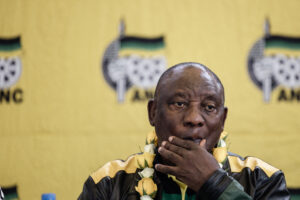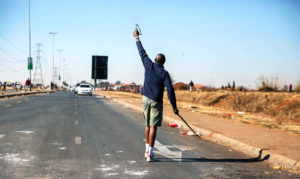A disrespectful Afrikaans expression refers to a person seeing their gat or backside. It means to get one’s comeuppance. In last week’s South African 2024 general elections, the ruling African National Congress (ANC) saw its gat and the only remaining question is whether the country will as well. From its heady days of 72% support 20 years ago, the party slumped to 40%, losing 70 seats in Parliament and its majority, its seignorial pretentions, and its unrestricted access to the channels of corruption which has funded it and its leaders for 30 years.
Disillusioned ANC supporters stayed home everywhere. The party lost its majority in Gauteng, the country’s economic heartland, and the populous and tumultuous KwaZulu Natal Province. An avenging five-month old radical party, Umkhonto we Sizwe, headed by disgraced and deposed former President Jacob Zuma, swept the polls in the Zulu heartland and emerged the third largest party nationally.
The liberal opposition Democratic Alliance (DA) held the Western Cape and a clutch of small ethnic and regional parties also made incremental progress. Another Zulu-based movement, Inkatha Freedom Front (IFP), increased its share and held its fastnesses north of the Tugela River. The big loser was the urban radical and nativist Economic Freedom Fighters (EFF) which bled copiously to the even more extreme and anarchic MKP. Socialist and redistributive voters trumped free market ones two-to-one.
The architect of the ANC’s decline is its own President, Cyril Ramaphosa, who was elected with the highest hopes in 2019 that he would be a reformer and an energiser after the eight years of plunder and decay of his predecessor, Jacob Zuma. He was neither, the country deteriorating by virtually every metric possible compared with the country’s halcyon days under former ANC presidents Nelson Mandela and, to a lesser extent, Thabo Mbeki. His weakness in failing to promptly extirpate the Zuma saboteurs from within his ranks years ago, and to lead a reformist national alliance, opened the gap for the extremists such as the EFF and MKP and disheartened even his most ardent supporters. He too has seen his gat and may lose his job.
Few will feel sorry for Ramaphosa. Perhaps fewer still for voters who seem wholly indifferent to either the competence or honesty of their public representatives and routinely vote for their own dispossession by marauding political elites. Such is the allure of tribalism and race.
All this has brought the country to a decisive moment. Initial hopes by the ANC that it could cobble together a majority from pliant smaller parties are dashed. Will the viviparous ANC, still kingmaker after 30 years despite everything, cast towards its offshoots like the EFF (sprung from the ANC Youth League) or the MKP (the former ANC Zulu diehards) to keep power? Or towards the DA and its liberal-reformist Multi Party Charter? If the former, it brings either 51% or 55% of the electorate and what analyst Dr Frans Cronje calls the Chernobyl Option, keeping power in the short term but sowing the seeds of its own destruction. If the latter, it brings 76% of the electorate and possible economic redemption.
A pre-poll survey by the authoritative Brenthurst Foundation found that South Africans rated weak leadership as a bigger threat than crime, more than three quarters were happy with a coalition Government, and 54% were in favour of a coalition which included liberal parties or ANC and liberal parties. This public expression should guide the ANC but probably will not, which is why it is in the position it is.
The next few weeks of cattle-trading will be decisive. It is not certain Ramaphosa will remain in office: there are just too many ex-public representatives out of a job and more to come in the next municipal elections. For many, it is literally back to the shack. If Ramaphosa stays, the Chernobyl Option is real. If he goes, one option is that the ANC might do a deal with the MKP, which brings the country back to square one and reinforces the conspiracist view that the MKP was all along an ANC false flag operation to recapture by subterfuge the Zulu vote. The other fading option is that he is replaced by a pragmatist from within the ANC (current Finance Minister Enoch Godongwana is in the frame). This would split the ANC and do what Ramaphosa was paid to do by his business sponsors in 2019 but did not: rid the ANC of its dross and launch the country on a programme of remodernisation.
The positive is that despite all past and looming threats, South African democracy is alive and functioning. There was little pre-election violence and a relatively stable, albeit sporadically dysfunctional, electoral process. There are numerous challenges but none that yet appears systemically threatening. The Judiciary intervened when called to defend the process and the media and independent observers were omnipresent and unfettered.
Vital indicators emerge from these elections. The first is the salience of identitarian or, in its South African context, tribal and ethnic mobilisation, its reality long denied or ignored by white liberals and the black elites. Black South Africans voted overwhelmingly for black parties; whites mostly voted for the DA and the Afrikaner dominated Freedom Front Plus (FF+); mixed-race people deserted the traditional parties to support “brown” and “first nation” parties, the most wildly popular headed by a convicted ex-bank robber who demands the return of the death sentence, and many Asian descended people, when not voting for the DA, voted for tiny local, religious, family and regional parties. With 54 registered parties contesting, there was an embarrassment of choice.
Zuma’s party did best in its Zulu heartland and Zulu-speaking regions in the eastern parts of the country. The ANC triumphed in the Xhosas-speaking Transkei region, its place of historic origin, and the northern parts. The DA benefitted from the huge counter-migration of whites back from the hinterland to the coast and abroad (74% of expatriates voted DA), fleeing the collapse of the northern metropolises. Ramaphosa’s indecisiveness and cowardice has thus decisively slain Archbishop Desmond Tutu’s Rainbow Nation, if it ever existed. A catastrophically failed ANC leadership through decades has ensured that South Africa is demographically and politically reconfiguring itself back into the 19th century.
Underlying these election results has also been a significant generational aspect. More than two-fifths of the voters were between the age of 18-34. Initial surveys show significant numbers voted for either EFF or MK. To these young voters, the mystique of the ANC holds little allure: the prospects of jobs and a better life do, although, tragically, their political choices last week will certainly defeat their personal hopes. More, the advent of the young disconnected radical, no different from counterparts across the developed world, diminishes the power of the trade unions, historically one of the ANC’s key support pillars but now widely regarded by many unemployed young blacks as anachronistic as the ANC itself. The real face of the ANC thus emerges. It is old, raddled and utterly bereft of ideas.
These elections have consolidated another theme of recent politics in South Africa: localism at both the regional and metropolitan level, a trend which will be hastened by the next round of municipal elections. This process has been underway for some time. As the central State withers, private initiatives move to fill the gaps in education, security, health and most recently in utilities like electricity and water. At the core of this cantonal impulse at municipal level, graced by the name of co-governance, has been the DA and some smaller parties, modest gainers in the elections. The process may promise a sunshine option to the numerous wealthy quasi cantons stretched along the Indian and Atlantic shorelines, but it presages even greater disparities in income and lifestyle chances nationally.
So too at provincial level where two powerful secessionist streams are running, one in the Western Cape, where polls suggest between 46% and 70% of the people wish to break away, and the other in the ever-volatile KwaZulu Natal where a vociferous lobby, the Abantu Batho Congress (ABC), is calling for an autonomous Zulu Kingdom. The extent to which these movements flourish depends on whether the ANC goes into alliance with one of its offspring movements (spurring Western Cape independence) or whether it does not (driving KwaZulu Natal’s simmering revolt).
KwaZulu Natal, a fiercely contested arena, faces a fraught and unpredictable future. The upstart Zulu-based MKP, patroned by the indestructible 82-year-old Jacob Zuma who is bizarrely still allowed to hold ANC membership, has made huge inroads, stripped the EFF of support (cruel, as the EFF galvanised the young who now vote against them), and annihilated the ANC in both its urban and rural strongholds, emerging with 45% of the provincial vote. The DA’s premier candidate, a presentable young, white gay man able to speak fluent isiZulu, had no chance against the flood.
Reasons for the MKP’s success is a volatile mix of blood, disillusionment and rage: Zulu chauvinism, attraction to the MKP’s policies of radical economic “transformation” (translation: expropriation of private wealth in favour of an avaricious and unproductive new black elite), a traditional Zulu respect for age, a sense Zuma has been wronged by Ramaphosa, but mostly because of an utter public weariness with the ANC’s violently factional and failed rule in the province. In the wake of the abortive insurrection of July 2021 in which the State went AWOL and left local communities to fend for themselves, a revolt inspired by some now sitting in the MKP, I wrote that this province would never forgive Cyril Ramaphosa for allowing it to happen. It did not, but incredibly, many now seek salvation from the very quarters that caused the tumult.
It is uncertain who will rule in KwaZulu Natal. An ANC-IFP-liberal alliance is still possible. If it fails we should expect an unappealing mélange of medieval kingdom (the recently anointed King Misizulu Zulu is severely miffed at the ANC for challenging his sole directorship of 2.8 million ha of communal land), a radicalised tribal party, and a shadow despot who was arguably the most corrupt President in South African history.
Zuma is prevented by law from holding public office for five years due to a recent conviction for contempt of court and this is likely to be the first violent bone of contention between the State and a party which in its short life, like its leader, trails a succession of criminal and civil litigation and has brought chaos everywhere it has gone. A second bone would be if MKP is denied power in the province by an alliance of opposition parties: the balance is knife-edge. Today, police and military reinforcements are deploying into a wary but uncertain calm. KwaZulu Natal, historically the most fought over patch of South Africa, home to my family for five generations, deserves better than this. The nation does.
Disclaimer
Some of the posts we share are controversial and we do not necessarily agree with them in the whole extend. Sometimes we agree with the content or part of it but we do not agree with the narration or language. Nevertheless we find them somehow interesting, valuable and/or informative or we share them, because we strongly believe in freedom of speech, free press and journalism. We strongly encourage you to have a critical approach to all the content, do your own research and analysis to build your own opinion.
We would be glad to have your feedback.
Source: UnHerd Read the original article here: https://unherd.com/



